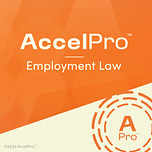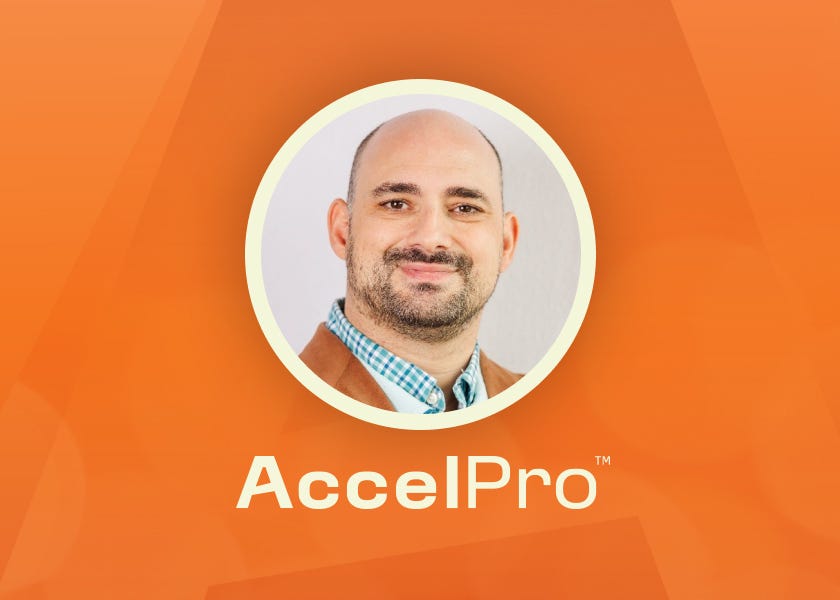Listen on Apple Podcasts, Spotify and YouTube.
Welcome to AccelPro Employment Law, where we provide expert interviews and coaching to accelerate your professional development. Today, we are featuring a discussion with Anthony Paradiso about how to build a strong culture rooted in diversity, equity and inclusion.
Paradiso is the vice president of HR support services for Industrial UI Services. He has led DEI efforts for the New Jersey chapter of the Society for Human Resource Management (SHRM) and conducted trainings, workshops and lectures for employers. He says the three keys to a strong DEI culture are company policy, training and compliance. And he believes that authenticity is the common thread all three of them need to be successful.
“It couldn’t get more important than being authentic,” he says. “After the George Floyd incident, a lot of organizations were making statements on what they feel should have happened or should be happening, but then they never really followed through on those statements. So whatever you put in your handbook, enforce. Don’t put it in there just for words.”
Basic Membership: One full interview each month, including this one, along with samples of the weekly podcast and occasional events.
Monthly or Annual Membership:
The weekly podcast, available in the player of your choice
Transcripts and supplemental materials for each interview
Private group events inspired by your requests
Curated collections from the archive, including Worker Classification and Discrimination
CLE credit based on AccelPro interviews is coming soon
If you sign up now, your annual membership will include a free trial and a discount of more than 40%.
Interview References:
Anthony Paradiso’s LinkedIn profile.
Related AccelPro Interviews:
TRANSCRIPT
Matt Crossman, Host: We’re going to talk about the three keys to a strong DEI culture: compliance, training, and company policy. But before we do that, I want to lay the groundwork for your passion and experience on this topic. You are the vice president of HR Support Services with Industrial UI Services. What do you do in that role?
Anthony Paradiso: I wear many hats. I’ve been with Industrial UI Services since 2008. We are an unemployment insurance cost-control company.
I was asked to lead our state Society of Human Resource Management council and chapter for New Jersey, which is where I reside. They wanted to focus on DEI efforts—diversity, equity, inclusion. I took on that volunteer role and that’s where my passion came from. As a part of the LGBTQ plus community myself, it was personal for me.
So I give talks, lectures and workshops on the basics of DEI, unconscious bias, microaggressions and the importance of inclusion.
MC: The keys are compliance, training and company policy. Let’s start with company policy first. For a chief diversity officer, employment attorney and HR exec who are examining their own policies, what are the keys to an effective and enforceable DEI policy?
AP: The first thing you want to do is lay the groundwork as far as what it is you want your company to focus on in the DEI space. A lot of organizations have a mission and vision, but that might be just for the organization. And then some organizations also have a dedicated space for DEI—what the mission is and vision is of where they want to be within their scope of DEI.
You want to figure that out first. What do we want to accomplish with this?
Anything you put in your handbook or anything you’re going to put out as initiatives, you want to make sure you’re doing it, you’re not just saying you’re doing it. After the George Floyd incident, a lot of organizations were making statements on what they feel should have happened or should be happening, but then they never really followed through on those statements.
So whatever you put in your handbook, enforce. Don’t just put it in there just for words. Make sure you’re putting it in there and you’re going to be using it. A lot of companies have diversity councils, and employee resource groups are something you want to consider also. What works for one company may not work for another company.
It’s little things that you don’t notice that go a long way. When you’re looking specifically at your handbook, you want to be careful when using gender in your policy. I know some handbooks that I review now still have he or she, and instead you want to use they or them.
A lot of handbooks now have policies about pregnancies and what you’re allowed to do as far as lactation for example. And some companies still put nursing mothers as their subject. Instead put nursing employees. Again, it’s those little things that you don’t notice that go a long way.
Is it a big deal to really change it? Does it take much effort? No. So look through your handbook, be careful, and make sure that you’re listening to your employees.
Make sure to talk to your employees about what’s going on.
MC: So that’s policy. Let’s talk about training. I love this quote from you. “You just can’t hire someone like me to come in for an hour to check off a box for a year. There’s much more to it.” What are some keys to successful DEI training?
AP: Luckily organizations are realizing now that you can’t have someone just come in for an hour to do a DEI training. It’s so much more than that.
Companies realize they need to have someone come in and take the time and effort to train their employees on what DEI really is. It’s a lot of work. It takes a lot of patience.
If I come in for an hour and speak with you, you’re going to remember maybe 1 percent of what I said. And then after a month, you’re going to forget it all. So it’s important to have someone like me coming in constantly to do trainings.
We go over the basics, and it’s also team exercises and team building and development. You want to make sure you’re putting people into groups where they can have conversations.
My motto is always “be your authentic self.” And you really can only be your authentic self if you’re telling your story. And we all have a story. Maybe when you grew up, you went through tough times. Maybe it was hard for your parents to put food on the table.
So it’s talking with one another, getting to know each other’s stories. That’s only going to benefit the relationship between those two employees, which only benefits future projects. You’re going to have team building and effective collaboration.
Yes, there is obviously a cost for employers to do this, but the benefits are staggering when you have a more diverse workforce, a more inclusive workforce. So it’s just a matter of taking that time to have these initiatives effectively communicated and and effectively executed.
MC: So if you’re a company that has somebody come in for an hour, that’s not really being authentic. How important is authenticity in the training and the creation of the policies in the first place?
AP: It couldn’t be more important. When you’re creating this DEI initiative, talk with your staff, talk with your management on what it is you want to accomplish. What kind of diversity training do you want? Do you want it more concentrated on unconscious bias? Do you want LGBTQ plus training involved? Do you want to improve your employee resource groups and a diversity council?
So it’s important to have these conversations in the very beginning so you can create that authentic approach. When you’re doing these training sessions, always keep in mind that you don’t want someone just speaking. You want to have engagement with your employees. Without that, it’s not going to go far.
MC: I read often that proper training creates a first line of defense. Is that true? And why is having a strong first line of defense important on DEI?
AP: You don’t want to wait for something to happen. You want to be there before everything happens. During Covid, a lot of trainings happened because of the George Floyd incident. I’m happy that we did those trainings, but it would have been great if we were doing trainings prior to that.
We’re in a different world now. Millennials are more than 50 percent of the workforce and are having these conversations at work that we didn’t used to have. Ten years ago, we didn’t discuss politics or religion at all at work. We were steered away from that. But now that people are having those conversations, how do you do that?
If you’re on a team and you have very opposing political and personal views, how do you still work with one another? You don’t want to put it aside because things are going to come up and so you might as well get the conversation going.
MC: I have a more nuts and bolts question for you related to how training has changed in the wake of Covid. Has training returned to being as in person as much as it was before, or is the virtual component still going strong?
AP: I do prefer in person just because nothing beats that. You can have a conversation. You can see people’s faces, how they’re nodding, if they’re agreeing, not agreeing, people can raise their hand, ask questions.
I like having an engaging audience as I speak. Rather than giving a presentation and then doing Q and A, I prefer the back and forth during, which is hard to do virtually.
But if an organization wants to have someone speak, they may not want to spend the money to do it in person. A lot of times, I end up doing both. If there’s something very sensitive, we tend to do it more in person, but if it’s something very basic, maybe we’ll just do a quick virtual.
So they sometimes work hand in hand. It’s just a matter of picking which one is best for the situation.
MC: OK, we tackled policies. We talked about training, now let’s talk about compliance. What are some best practices around compliance?
AP: First off, it depends what state you’re in. There are federal regulations, state regulations, and there could even be municipality, city or town regulations.
You have to make sure that whatever policy you’re going to be changing or implementing meets that criteria. So I would always recommend speaking with your employment attorney.
You want to make sure that you’re putting your correct posters at your workplace. And now that we are in a virtual setting, you want to make sure.that you’re also putting your notices virtually in a shared drive and in your intranet. That’s very important.
Make sure that if you have a hybrid or a remote workforce, you have set guidelines for your remote workers and hybrid workers, because again, we’re in different times now.
MC: Now I’m going to pivot and ask you some professional development questions. How have peer-to-peer relationships been important in your career?
AP: Nothing beats peer-to-peer networking. I always recommend to people to try to meet someone weekly. This is where the virtual piece comes into play, where you can schedule meetings with people that you may have never met. And you just speak to them about what they do and what you do, and how you can help that person.
MC: I heard an interview with you in which you said as a young man you thought you might become either a teacher or a lawyer. In an interesting way, it’s almost like the role you’ve taken on in HR has a mix of both of those.
AP: You’re right: with the compliance piece and the handbook piece you have to be aware of the different laws. And then when you’re training and doing workshops, you are teaching. So it’s very interesting how they both kind of blended together as my career developed and continues on.
MC: Did you have any experience public speaking before you started training? That would make some people very nervous. How do you prepare yourself to speak in front of crowds?
AP: When I did the DEI work with my state council, that’s what really pushed me into public speaking. I really wasn’t a public speaker until then.
And I really don’t consider myself one now. I consider myself just a regular person. I speak about issues that are important to me. I go over my own stories, what I went through coming out.
I look at it as me just talking, and the listener can take me as who I am. As far as preparing, I create my slide decks. But I know my information. If I don’t know something and someone asks a question, I’m going to simply say that I don’t have the answer. I’m not afraid to say that at all.
If I prepare too much, then I get very nervous. Everyone has their own way of doing it. I know a lot of people prepare for hours and hours and that’s fine too. We all have our ways of doing our own thing.
This AccelPro audio transcript has been edited and organized for clarity. This interview was recorded on August 30, 2023.
AccelPro’s expert interviews and coaching accelerate your professional development. Our mission is to improve your day-to-day job performance and make your career goals achievable.
Send your comments and career questions to questions@joinaccelpro.com. You can also call us at 614-642-2235.
If your colleagues in any sector of the employment law field might be interested, please let them know about AccelPro. As our community grows, it grows more useful for its members.












